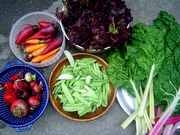

|
| Vegetable Varieties for Gardeners is a citizen science program
|
|
|
|
'Snowbird' Peas |
| |
| Sub-Category: |
Snow
|
| |
|
| Sub-Category 2: |
| | Description: |
Snow. Very early. 3-inch pods in clusters of two or three borne on 18-inch vines.
|
| Days To Maturity: |
58
|
| Seed Sources: |
|
| |
| Rating Summary |
| |
Overall: (3.5 Stars)
Taste: (4.0 Stars)
Yield: (3.5 Stars)
Ease/Reliability: (4.5 Stars) |
| |
| Reviews |
| |
Login to share your Review of Snowbird.
Number of Reviews: 2
KEY: O=Overall Rating, T=Taste, Y=Yield, E=Ease
Reviewed on 05/13/2016 by
casual gardener
- An experienced gardener
|
 Overall Overall
 Taste Taste
 Yield Yield
 Ease Ease
|
Denton, Texas, United States
Frost Free Season: More than 203 days
Soil Texture: Clay
Garden Size: Large - More than 1,600 square feet (40' x 40')
Sun Exposure: More than 8 hours per day
|
| I planted Snowbird peas in the garden and in a container. I wasn\'t impressed with the garden version at all. However, the container version was pretty good. I planted about 9 peas in a circle with a small tomato cage. (22"planter) I would recommend it in a container. I\'ll plant the rest of my Snowbird seeds in containers only. |
| |
|
Reviewed on 12/31/2007 by
sacratomato70
- An experienced gardener
|
 Overall Overall
 Taste Taste
 Yield Yield
 Ease Ease
|
California, United States
Frost Free Season: More than 203 days
Soil Texture: Clay
Garden Size: Large - More than 1,600 square feet (40' x 40')
Sun Exposure: More than 8 hours per day
|
| This is a really nice snow pea compact enough for containers and great enough to be grown in small spaces. I planted seeds in January and had a decent crop by early spring. Pods are 2-3 inches long and it's best to pick before pods swell or they tend to be a little tough, typical of most snowpeas. Likes cool weather and does not fare well when temps get over 75-80 degrees on average in Zone 9. Best planted in fall or the first part of the year. I will plan on growing again. |
| |
|
|
|
|
Vegetable Varieties for Gardeners is a citizen science program, © 2004-2024, All Rights Reserved
Cornell Garden Based Learning, Cornell University College of Agriculture & Life Sciences, Horticulture Section
|






 VVfG home
VVfG home
 Overall
Overall Taste
Taste